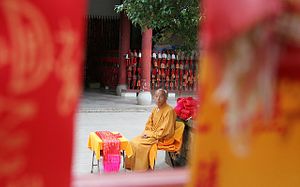As about half of China’s 1.4 billion people are currently traveling home and abroad during “super golden week” (an 8-day national holiday from October 1 to October 8), the more than 80 million Chinese Communist Party (CCP) members once again are faced with a pressing question: is it OK for them to visit temples or other religious sites?
As the highest internal-control institution of the CCP, the Central Commission for Discipline Inspection (CCDI) recently gave specific instructions on the issue. In late September CCDI published an article elaborating on three scenarios party members may faces in which law, party discipline, and religion come into conflict.
In the first case, a retired party member “Mr. He” joined a religious group which was classified as a cult. He not only participated in the religious group’s events, but recruited others to join the group. The CCDI’s article said Mr. He’s problems were serious, since he had violated both the party discipline and the law for “abetting others to join the cult.”
In the second case, “Mr. Shan” was a vice mayor of a city as well as a party member. He would make a pilgrimage to temples for all important religious days. In addition, he would practice fortune telling to predict his future. The CCDI’s article said Mr. Shan didn’t violate the law but did violate party discipline for “betraying the belief (in Marxism).”
In the third case, “Mr. Wang,” a party member, enjoyed traveling and sightseeing. He would visit temples and other religious sites during vacations. The CCDI’s article said Mr. Wang was fine, since he just visited the locations, but didn’t engaged in any religious affairs.
A number of Chinese media outlets reposted the article recently, perhaps aiming to allay the concerns of party members on vacation.
In theory, CCP members are supposed to be atheists, although in practice many CCP members have continued to practicing their spiritual beliefs. Yet, since Chinese President Xi Jinping came into office, the party has become more focused on discipline, clamping down not only on corruption but scrutinizing each member’s way of life ,including their spiritual life, more closely.
In mid-July, Wang Zuo’an, the director of China’s State Administration for Religious Affairs (SARA) published an article on the Qiushi Journal, the flagship magazine of the CCP Central Committee. He said that CCP members should not seek value and faith in religion, and that those who have religious beliefs should be persuaded to give them up, and if resist, they would be punished by the party.
“The party members should not have religious beliefs, which is a red line for all members … members should be firm Marxist atheists, obey the party rules and stick to the party’s faith … they are not allowed to seek value and belief in religion,” Wang wrote. In addition, he added that all party members are forbidden from supporting or getting involved in religious affairs in the name of developing the economy or diversifying culture.
Wang’s article was regarded by many experts on China as a warning from the CCP to its members.

































